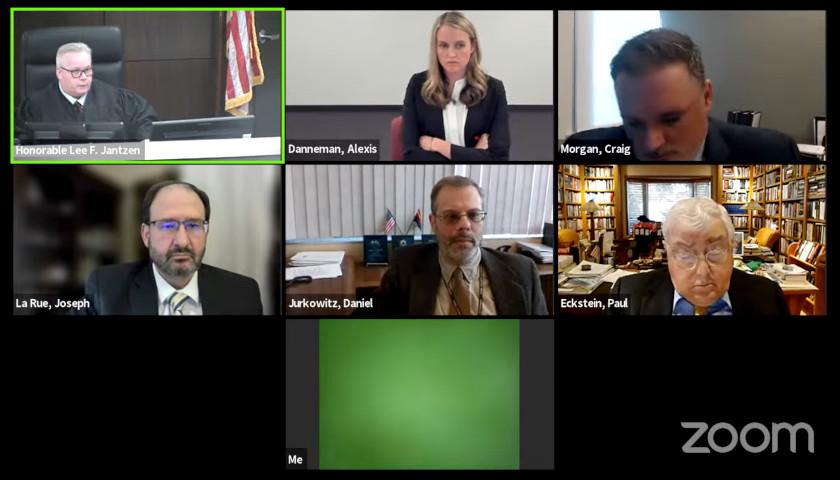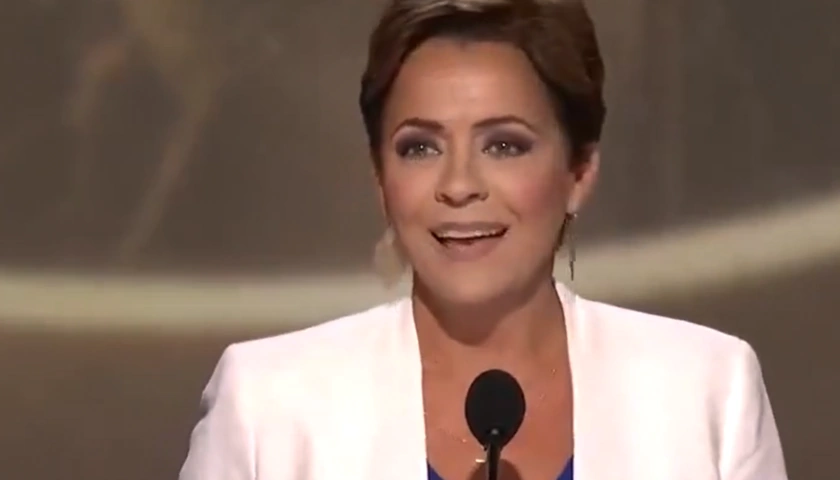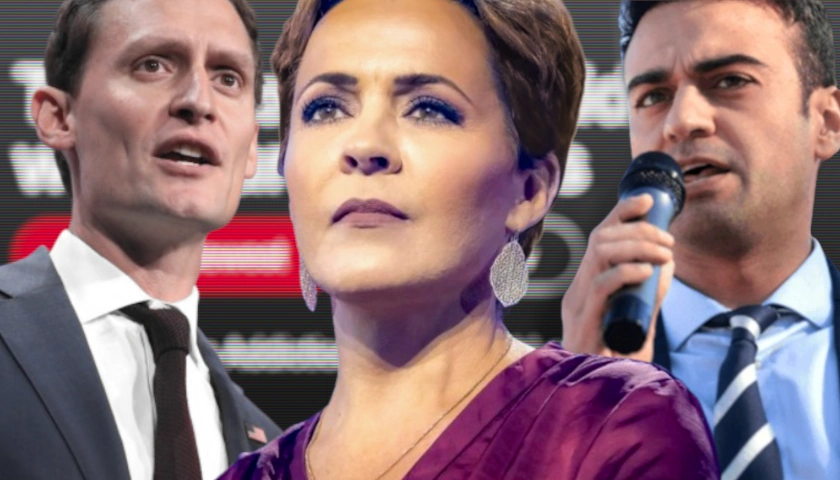Mohave Superior Court Judge Lee Jantzen heard oral arguments on Tuesday over whether Abe Hamadeh should receive a new trial in his election contest of the attorney general’s race. Jantzen dismissed Hamadeh’s case after the initial trial on December 22, 2022, but Hamadeh discovered new evidence after the trial that then-Secretary of State Katie Hobbs withheld, which revealed that “undervotes” were discovered in Pinal County, votes that were erroneously not counted. After they were included, Democratic Attorney General Kris Mayes’ lead over Hamadeh shrunk to only 280 votes. Hamadeh asked the court for a new trial to consider as many as 76,339 votes that Hamadeh said he believed were not counted throughout the state.
In a statement released after the hearing, Hamadeh said, “I feel confident that we will prevail once all of the evidence is presented to Judge Jantzen. We have been careful to only make those claims that we believe we can prove and that will make our democratic process stronger. On a number of occasions, I was willing to accept the purported outcome of the results. However, after further inspection our team has discovered information about the mismanagement of the election, including the gross disenfranchisement of voters. I am compelled to see that no voter is disenfranchised because of my commitment to our Republic and the democratic process so many of my fellow veterans sacrificed their lives to protect.”
Jennifer Wright, former Election Integrity Unit civil attorney for the attorney general’s office who now represents Hamadeh due to her belief that the winner, Mayes, targeted her after taking office, presented the main case for why Hamadeh should receive a new trial.
“Provisional ballots will alone prove he won,” she said.
Team Hamadeh in Mohave County Superior Court… requesting a NEW TRIAL to uphold the WILL of the VOTERS! @JenWEsq @AbrahamHamadeh @AbeWarRoom @SonnyBorrelli @realAlexKolodin pic.twitter.com/gpdvQ8DbAn
— Wendy Rogers (@WendyRogersAZ) May 16, 2023
Wright said Hamadeh’s team believes there are at least 466 uncounted votes in the attorney general’s race, which is more than the 280-vote margin between the two candidates. She asked the judge to let Hamadeh inspect the 76,339 undervoted ballots they have located statewide pursuant to A.R.S. 16-677(A). It provides, “After the statement of contest has been filed and the action is at issue, either party may have the ballots inspected before preparing for trial.”
She said the team heard from 1,100 Maricopa County voters who found their votes were “erroneously rejected.” Most of them discovered that their voter registration had mysteriously been changed to another county before the election, forcing them to vote a provisional ballot, which was not counted. These were high-propensity voters who had voted in 2018, 2020, and some even in the 2022 primary. They all had a piece of property in another county, and their voter registration was changed to that county without their knowledge or permission, “violating due process.”
Wright explained that since a canvass revealed that 69 percent of voters in Arizona on Election Day chose Hamadeh, versus only 27 percent for Mayes, she said she believes Hamadeh would net 445 new votes from the 1,100 — more than the 280 vote difference between him and Mayes.
She also explained that the electronic images taken of the ballots can be filtered only to show the undervotes, not the voters’ personal information.
“The machines cannot accurately interpret their intent,” Wright said. “We are asking the court to count and determine with mathematical certainty the number of votes cast in the attorney general’s race based on reviewing that — not just clear and convincing evidence, but the best evidence to balance themselves.”
Wright pointed out that even Maricopa County admitted the problems with undervotes.
“Maricopa County Elections Director Scott Jarrett testified over and over again that he did not know why certain votes were not counted, and instead recorded as undervotes,” she said.
She expressed concern about Hobbs taking a position on the litigation.
“But surprisingly, at the December 23 evidentiary hearing, then-Secretary Hobbs, who should be a neutral, nominal party to an election … the election contest statutes do not even require the Secretary to be a party to the case. Hobbs asked to dismiss, stating Hamadeh had no evidence, but Hobbs knew about the [uncounted ballots],” the lawyer said.
Wright said Hobbs may have known going back as far as December 7, 2022, that there were undervotes in Pinal County before Hamadeh filed his election contest. Hobbs’ attorneys claimed that a judicial order in Kari Lake’s litigation prevented her from revealing the undervotes, but Wright pointed out that the judge’s gag order on revealing the totals in the recount only applied to counties, not the Secretary of State.
Hamadeh tried to obtain the information about the undervotes through public records requests and asking the court but was only provided it on December 31, 2022, well after the December 22, 2022, trial.
Wright compared the situation to a similar election contest in Arizona’s history, Hunt v. Campbell. In 1916, George Wiley Paul Hunt was declared the winner of Arizona’s gubernatorial race, but after accusations of election fraud surfaced, litigation ensued, and 13 months later, the Arizona Supreme Court replaced him in office with his opponent, Thomas E. Campbell.
“What is old is new again,” Wright said, “and that’s why Arizona statutorily provided for election contests, to allow the judicial process to examine, question, and contest elections, especially ones that are so very close and where the questions linger about the legitimacy of the results. The process is key to restoring wilting confidence in election administration.” She added, “We are not outside the norms of these delicate, complicated, important proceedings.”
Several of the attorneys for the defendants were from Perkins Coie. This Democratic firm represented the Democratic National Committee and was hired by Hillary Clinton to pay Fusion GPS for the fake Steele dossier on Donald Trump. Other attorneys for the defendants were from Democracy Docket, the progressive firm led by activist attorney Marc Elias that intervenes in cases involving voter disenfranchisement of Republicans.
Alexis Danneman, a Perkins Coie attorney representing Mayes, declared that there was “no proof” and “no evidence” provided by Hamadeh. She claimed it was “unprecedented relief” to allow his team to look at ballots. She said the statutes don’t allow for new trials in election contests. She claimed that Hamadeh only speculated that examining the ballots would change the race results, characterizing his position as saying the inspection would “probably change the results.” She dismissed his request for a new trial.
“They had a trial, they had an opportunity to put on their case,” she said.
Craig Martin, attorney for Secretary of State Adrian Fontes, who previously worked at Perkins Coie, said the most important aspect is that the election is settled.
“Arizonans deserve finality in the 2022 general election,” he said.
Wright was permitted a rebuttal. She clarified that the team was not asking for a recount; they were merely asking to count the votes that were never counted in the first place. She said regarding the defendants, “They’re afraid to even look at the ballots.”
Wright said the hundreds of disenfranchised voters “can come into court and testify and be cross-examined.” She added, “We haven’t submitted evidence since that’s what a trial is for.”
Paul Eckstein, another Perkins Coie attorney representing Mayes, told Jantzen that Hunt v. Campbell was “so different” because the parties stipulated to the recount. Jantzen interrupted him and stopped him from continuing, “And it was before we had a statute that actually dealt with recount so all that stuff is different,” he said.
Jantzen said he would take it under advisement and issue a ruling on whether to grant a new trial within two weeks. He said he already knew the date he would release it but would not reveal it publicly. He added that he didn’t need to hear any arguments on the defenses’ motions for attorneys fees since he had enough information from the pleadings to decide.
– – –
Rachel Alexander is a reporter at The Arizona Sun Times and The Star News Network. Follow Rachel on Twitter. Email tips to rachel.r.alexander@gmail.com.





